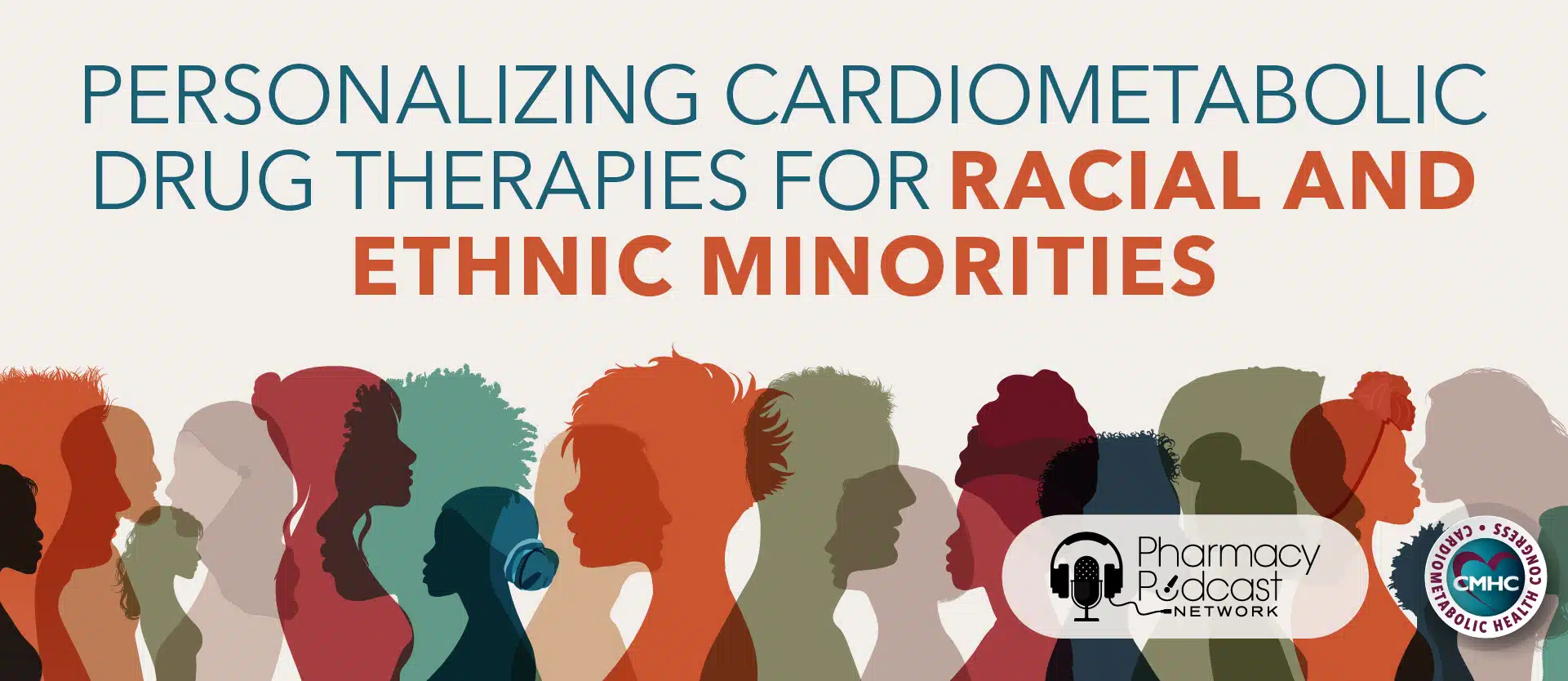Certain populations of ethnic and racial groups respond differently to many classes of drugs. While there are many factors that can influence drug response, one area that has emerged as helpful to clinicians in recent years is pharmacogenomics (PGx). Using PGx strategies to improve therapeutic outcomes for ethnic and racial populations is the topic of this week’s Pulse Blog article. It was written by Jennifer Marquez, PharmD, CPGx, and Jamie Wilkey, PharmD, CPGx, both members of Pharmacy Podcast Network, a Cardiometabolic Health Congress (CMHC) partner organization.
We have a problem
Race and ethnicity are part of what makes each of us unique. Historically, racial and ethnic minorities have experienced barriers to receiving appropriate healthcare. Studies have shown that ethnicity can also influence our responses to medical treatments, and we must take that into account when treating our patients. A recent study demonstrated that racial and ethnic minorities experience poor cardiometabolic (CMB) profiles at each level of income and insurance. This suggests that traditional barriers to care, while significant, might not be the only factors influencing treatment outcomes – perhaps genetic and other factors are playing a significant role as well. Providing optimal care for ethnic and racial minorities can be challenging.
We have a solution
For many years, we have known that different ethnic and racial groups of patients respond differently to many classes of drugs. While there are admittedly many factors that influence drug response, one area that has emerged as helpful to clinicians in recent years is pharmacogenomics (PGx). PGx analyzes how the genetic makeup of an individual affects their response to drugs. Differences in allele frequencies for various pharmacogenes have been observed between different ethnic and racial populations of patients.
For example, variants in certain genes can significantly alter the metabolism of commonly prescribed medications. A recent study analyzed nine ethnic groups and showed distinct patterns of gene variant distribution. At least 60% of participants had at least one potentially actionable variant, and a significant proportion of those would likely be prescribed an agent that is subject to that metabolic pathway, including clopidogrel, SSRIs, PPIs, or voriconazole. Knowing about such variations in drug response can improve drug therapy outcomes, but only if the variants are identified and acted upon. Examples of CMB drugs for which there are PGx clinical guidelines include statins, beta-blockers, ACEIs, ARBs, warfarin, clopidogrel, and antiarrhythmics.
Examples of how certain ethnic and minority groups can benefit from this personalized approach to health care are abundant. For example, studies have shown that Caucasians and African Americans have a prevalence of 1-7% “poor metabolizer” status for the gene which activates clopidogrel. However, Asians have a prevalence of 13-23%. An alternative to clopidogrel is recommended in this scenario. Whether or not these variants are identified and acted upon has the potential to dramatically alter the patient’s clinical outcome.
We have support
Since PGx incorporation into both medical and pharmacy school curricula started only recently (within the last 5-10 years), many practicing clinicians are either unfamiliar with PGx, lack the confidence to implement it, or both.
The availability of scientific evidence that demonstrates the mechanisms by which we can personalize drug therapy for various ethnic and racial groups requires clinical action. It is a moral obligation to consider all things that can contribute to patient status. It will also be considered a professional and legal obligation.
Recent graduates of medical professional programs are more likely to possess the knowledge and confidence needed to successfully implement PGx in their clinical practices. For more experienced providers, many reputable companies have programs available to obtain PGx certification, including PGX101, ASHP, ACCP, and Mayo Clinic. Successful PGx implementation programs have been completed at St. Jude’s, Mayo Clinic, and the University of Florida, among many others.
There is also a growing network of pharmacist consultants nationwide specializing in PGx testing, analysis, and comprehensive medication management (CMM). Their goal is to help both patients and healthcare providers to optimize drug therapy. They seek to collaborate with physicians in order to improve their practices, ensuring that medical practices are considering all relevant factors that are important in order to optimize care for ethnic and racial minorities. While pharmacists are the ideal partner to help with understanding how best to implement PGx principles, it takes all of us on the healthcare team to use personalized-medicine technology to benefit every patient. Every patient is unique, and they deserve to receive care that considers all of their unique qualities.
References
- Javed Z, et al. (2022). Race and Ethnicity and Cardiometabolic Risk Profile: Disparities Across Income and Health Insurance in a National Sample of US Adults. Journal of Public Health Management and Practice. 28:S91-S100.
- Ermak G (2015). Emerging Medical Technologies. World Scientific. ISBN 978-981-4675-80-2.
- Ionova Y, et al (2020). CYP2C19 Allele Frequencies in Over 2.2 Million Direct-To-Consumer Genetics Research Participants and the Potential Implication for Prescriptions in a Large Health System. Clinical and Translational Science. 13(6):1298-1306.
- Pharmacogenomics and Personalized Medicine 4(1):123-36. November 2011.








